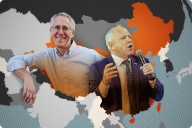You have /5 articles left.
Sign up for a free account or log in.
HONG KONG -- In the global economy, many nations want to be known as a "higher ed hub." Singapore, Malaysia, Hong Kong and several countries in the Middle East are all striving to attract some combination of local and international universities that would make them a regional center for education and research. The theory goes that some of the top student talent from the area may stay at home rather than rushing off to the United States, Britain or elsewhere. And that talent will then become an educated work force, providing key services and starting businesses.
In many discussions of hubs, they are mentioned as if they are interchangeable. Qatar has Cornell University and Carnegie Mellon University; Abu Dhabi has New York University and the Sorbonne.
But at a session here today at Going Global, the British Council's annual international education conference, educators from Qatar and the UAE pointed to the very different paths these two hubs have taken -- and to evolutions on both of those roads. Generally, the UAE has taken a much more decentralized approach to the development of higher education, but is now taking a series of steps to promote higher levels of quality. Qatar is known for a highly strategic approach that has attracted numerous top universities to Education City there. But an official of the Qatar Foundation, which provides the leadership for the effort, said that it's time to move beyond strictly national definitions of hubs.
Beyond the Single Nation Hub
Ahmad Hasnah, associate vice president for higher education of the Qatar Foundation, spoke with pride of the universities that have been drawn to Qatar's Education City and of the intellectual community that has been created there.
But Hasnah suggested that there may be flaws with the model of expecting a single nation to build up a true hub -- even if Qatar has done so. In many countries, he said, "a lot of the spending has not been in the right places," and there can be a false sense that any country can achieve excellence across a wide range of fields. In reality, he said, "you don't have to be excellent in everything."
Presidential Perspectives
If you missed Inside Higher Ed's
new survey of college presidents,
published last week, you can read
about it here.
Further, he said that it may not be wise to "depend on one government for funding," given that the interests of governments change. He suggested that it is time to focus more on regional hubs, with countries supporting efforts that cross borders. Such an approach can be difficult, he acknowledged, as universities value their autonomy and countries tend to be picky about when money "can cross borders." But noting that the Qatar Foundation works with universities all over the world, and that many other countries provide scholarships for students to study in Education City, he said this goal is attainable.
Hasnah also encouraged the many academics present from would-be education hubs to consider a financing model associated with the United States -- endowments -- and to possibly consider tweaking it. Hasnah said that top American universities have achieved their excellence in part because of the "financial stability" provided by endowments.
In many countries, Hasnah said, it may be difficult to get wealthy donors to make sizable permanent donations, so he suggested something of a loan system in which individuals would be persuaded to part with large sums of money for a defined period of time so that universities could earn the interest, but then return the initial gift at a specified time.
The idea of hubs that aren't focused on a single country seemed to captivate many in the audience -- and the concept was endorsed by some questioners, even as they wondered if governments would share Hasnah's views. "There's a kind of orthodoxy that education hubs are the way to go," said one audience member. "But a dependence on national and state governments is folly."
A Federal System
The UAE has captured attention of late with deals to start up campuses in Abu Dhabi by NYU and others. While Abu Dhabi has gone with this high profile approach, it is but one of the emirates in the UAE, which has a higher education system that is young and decentralized.
Consider that United Arab Emirates University -- the nation's oldest and largest university -- was founded only in 1976.
Wyatt R. Hume, the provost there, noted that for half of the institution's history, it was the only university in the country. While dozens have been created recently, only three are part of the federal system -- the remainder are affiliated with one emirate or another, with very different educational philosophies. Dubai has taken an approach of encouraging experimentation. Abu Dhabi has gone after some big players abroad.
The nation's universities also reflect a mix of sensitivity to local traditions and some challenges to them, Hume said. He noted that his institution was created to serve men and women -- not a sure thing at the time it was founded. But it was also created with separate programs for men and women. Today, 80 percent of students are women, he said. There will be challenges ahead, he said, because the country's leaders want more of their students educated at universities that, like his, do much of their teaching in English. But many high school students aren't provided an education that would make them able to pursue such an education, he said.
The UAE has turned to accreditation to try to ensure that there are floors on academic quality and to encourage efforts that address national goals, not just institutional objectives.
The Commission for Academic Accreditation reviews both institutions and individual programs -- and there are 71 licensed institutions there at last count, said Bruce Taylor, a commissioner. He described numerous steps taken to encourage frank reviews of institutions and programs, including the use only of review panels of academics from outside the country.
These reviews extend to international institutions setting up branches in the country. Generally, Taylor said, the UAE welcomes the branches and the interest, and the main concern is about whether all of these new programs will have "staying power." (In recent years, both George Mason University and Michigan State University have pulled the plug on campuses in the country.)
The accrediting commission is now embarking on a series of efforts to promote higher quality, Taylor said. First, it is working with other government agencies to establish "a national qualifications framework" so different degrees from different institutions will signify similar competencies (comparable efforts are fairly advanced in Europe and in more embryonic forms in the United States). Second, it is organizing efforts to bolster selected areas of the educational offerings, for example by promoting a "foundation year" for those who graduate from high school but need remedial education to succeed in college, and by looking for ways on the other end of the spectrum to grow doctoral education in the country. The commission is also looking to expand collaboration with universities and accrediting agencies in other countries.
Taylor said that he sees several ways to build higher education hubs. The efforts can be led directly by investments by governments, by individual institutions or by corporate interests. He said that the best approach must involve the government at some level, although not necessarily by shaping all the decisions. He noted favorably the extent to which the UAE has let individual institutions and emirates advance in their own ways. But he said that the commission's efforts point to the government role of "setting parameters."








